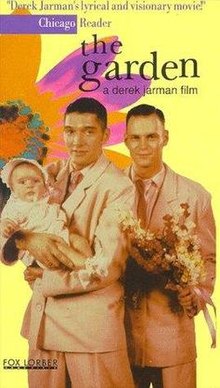fiction.wikisort.org - Movie
The Garden is a 1990 British arthouse film directed by Derek Jarman and produced by James Mackay for Basilisk Communications, in association with Channel 4, British Screen, and ZDF. It focuses on non-binary gender identities sometimes expressed within the, even then, barely acceptable conventions of its time including homosexuality and the internal conflicts felt by some LGBT+ people with a world view influenced predominantly by Christianity set against a backdrop of Prospect Cottage, Jarman's bleak coastal home of Dungeness in Kent,[2] and his garden and the nearby landscape surrounding a nuclear power station, a setting Jarman compares to the Garden of Eden or Garden of Gethsemenae.[3] The film was entered into the 17th Moscow International Film Festival.[4]
| The Garden | |
|---|---|
 | |
| Directed by | Derek Jarman |
| Written by | Derek Jarman |
| Produced by | James Mackay |
| Starring | Tilda Swinton Johnny Mills Kevin Collins Spencer Leigh |
| Narrated by | Michael Gough |
| Cinematography | Derek Jarman Christopher Hughes Richard Heslop |
| Edited by | Derek Jarman Peter Cartwright Kevin Collins |
| Music by | Simon Fisher Turner |
Production company | Basilisk Communications |
| Distributed by | Artificial Eye[1] |
Release date | 1990 |
Running time | 95 minutes |
| Country | United Kingdom |
| Language | English |
| Budget | GBP£380,000 |
Overview
Lacking almost any dialogue, the film is shown as Jarman's own subjective musings, which are tempered by the reality of his own mortality—when HIV-positive Jarman made the film he was facing death from AIDS. Jarman reads a moving elegy to lost friends at the film's end.[5]
The film follows a seemingly innocent and loving gender fluid couple whose idealistic existence is interrupted when they are arrested, severely humiliated, tortured and killed. In between this are nonlinear images of religious iconography — a Madonna (Tilda Swinton) who is overexposed and harassed by paparazzi in balaclavas; a trans woman who, to the background soundtrack of a fox hunt is similarly humiliated and shamed by paparazzi and privileged cis-women; Jesus who painfully watches the world pass him by; a Judas who is hanged and used as a tool to advertise credit cards; and water dropping from an image of Christ on the crucifix. The film is explicity not a purely "gay" film but one in which the director's struggles with gender fluidity and the need to adopt a compromise identity as a gay man are repeatedly made clear including scenes expressing distress at the abandonment of a feminine identity and the shallowness of a gay culture centered purely on sexual intercourse. Other images include the Twelve Apostles as 12 women in babushkas, sitting at a table by the seaside as they run their fingers around the edges of wine glasses to create an ominous hum.[5]
It also focuses on what it meant to be required to be viewed as queer in the 20th century, highlighting Section 28, of which Jarman was from the start a noted opponent. The film is augmented with unusually tinted shots of beaches and bizarre changes between classical, Cypriot and other types of music and sound.
Production
The film has a soundtrack by Simon Fisher-Turner and production design by Derek Brown.
Home media
The Garden is available on DVD and Blu-ray.[6]
Cast
- Tilda Swinton as Madonna
- Johnny Mills as Lover
- Philip MacDonald as Joseph
- Pete Lee-Wilson as Devil
- Spencer Leigh as Mary Magdalene / Adam
- Jody Graber as Young Boy
- Roger Cook as Christ
- Kevin Collins as Lover
- Jack Birkett as Pontius (as Orlando)
Other cast members; Dawn Archibald, Milo Bell, Vernon Dobtcheff, Michael Gough, Mirabelle La Manchega and Jessica Martin.
Reception
On Rotten Tomatoes, The Garden has a 100% approval rating, based on six reviews, with an average rating of 8.75/10.[7]
Janet Maslin of The New York Times in 1991, thought that the film was an "assemblage of turbulent images" and "is a peculiar blend of reflectiveness and fury". It "has a burning, kaleidoscopic energy" and "genuineness and pathos of Mr. Jarman's own situation".[5]
References
- "The Garden (1990)". BBFC. Retrieved 28 April 2022.
- Kent Film Office. "Kent Film Office The Garden Article".
- William Pencak The Films of Derek Jarman at Google Books
- "17th Moscow International Film Festival (1991)". MIFF. Archived from the original on 3 April 2014. Retrieved 4 March 2013.
- Maslin, Janet (1991). "REVIEW/FILM; Derek Jarman's 'Garden' Offers Visions of Decay". New York Times.
- "The Garden (Jarman)".
- "The Garden (1990)". Rotten Tomatoes. Retrieved 2 July 2020.
External links
На других языках
- [en] The Garden (1990 film)
[ru] Сад (фильм, 1990)
«Сад» (англ. The Garden) — британский артхаусный кинофильм 1990 года режиссёра Дерека ДжарменаДругой контент может иметь иную лицензию. Перед использованием материалов сайта WikiSort.org внимательно изучите правила лицензирования конкретных элементов наполнения сайта.
WikiSort.org - проект по пересортировке и дополнению контента Википедии